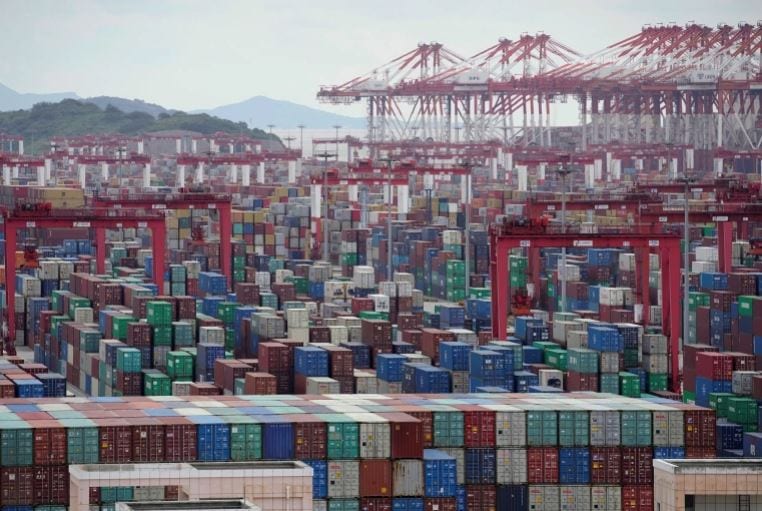Azerbaijan is one of the earliest countries to respond to and actively participate in the joint construction of the China-proposed BRI. How do you comment on the significance that joining the BRI has brought to your country? What are your expectations for strengthening cooperation under the initiative? Huseynov: The ancient Silk Road has already connected Azerbaijan and China. Azerbaijan is one of the first countries to support the China-proposed Belt and Road Initiative and has participated in numerous related investments and projects. Currently, relevant government authorities of Azerbaijan have reached an agreement with China’s National Development and Reform Commission, on signing a road map for jointly building the Belt and Road. The agreement covers various cooperative fields including trade, investment, transportation, technology, and finance.
The significance of the BRI extends beyond economic and trade; it serves as a platform for exchanges among different countries and civilizations. Since its proposal, the initiative has been actively promoting cooperation among countries and facilitating regional collaboration.
In my view, the value of this global cooperation initiative lies in “building bridges rather than walls,” demonstrating the spirit of cooperation and openness required for current global development. Azerbaijan looks forward to deepening multifaced cooperation with China in areas such as economic, trade, investment, green energy, interregional cooperation, cultural exchanges, tourism, and climate change.
GT: China possesses industrial advantages that encompass products such as NEVs. At the same time, Azerbaijan is actively promoting green transformation. How do you view the potential for cooperation between the two countries in this field?
Huseynov: China’s remarkable achievements in the field of new energy are well known. This November, Azerbaijan will host the 29th session of the Conference of the Parties to the United Nations Framework Convention on Climate Change (COP29) in Baku, the capital of Azerbaijan.
Recently, the Azerbaijani Minister of Ecology and Natural Resources and president-designate of the COP29 MukhtarBabayev visited China along with his delegation. This was the first overseas trip of our COP team, aiming to understand China’s expectations ahead of the conference. I believe that both countries share a high degree of consensus on the green agenda.
China leads in wind energy, solar energy, and electric vehicles and it is willing to share its achievements with other countries, demonstrating China’s open and win-win cooperation attitude.In Azerbaijan, Chinese companies are involved in the green energy transition as investors, builders, and operators. Recently, Azerbaijan initiated a bidding process to build a NEV factory. BYD successfully won the bid and signed an agreement to establish a joint venture company and set up an electric bus production line in Azerbaijan.
Additionally, we plan to gradually replace fuel-powered buses in the capital Baku with electric buses.
At the same time, we are also in communication with Contemporary AmperexTechnology – Chinese lithium-ion battery company – regarding the construction of energy storage production projects in Azerbaijan. The Embassy of Azerbaijan in China is also actively promoting green transformation and strengthening cooperation with China in this field, including replacing the embassy’s fuel vehicles with BYD’s NEVs. Moreover, Chinese companies are actively involved in investing and constructing photovoltaic power stations in Azerbaijan. We greatly appreciate China sharing its development experience and achievements in the field of new energy with other countries including Azerbaijan. In addition to the field of new energy, the potential for cooperation between the two countries is enormous in a number of fields. Azerbaijan is fully ready to develop economic and trade relations with China without setting any ceiling or limits in terms of scope, with cooperation in multiple areas including trade, technology, digitalization, agriculture, and logistics. GT: What is your perspective regarding the recent Western discourse on China’s “overcapacity” fallacy in new energy? Huseynov: China not only produces high-quality and affordable products but also is willing to share these achievements with the world. During the COVID-19 pandemic, China generously shared its vaccine and other important anti-pandemic items, helping many countries in overcoming hardships. Now, the world is at a crucial moment in the transition to green energy, and Chinese companies are collaborating with other countries with an open attitude to help them achieve this energy transformation. This initiative is worthy of praise. Regardless of how certain media outlets may perceive it, I greatly appreciate China’s open and cooperative attitude.
GT: How do you evaluate the achievements of the cooperation between the two countries when it comes to China-Europe freight trains? Are there any new plans to strengthen the capacity and transportation network of China-Europe freight trains?
Huseynov: Due to ongoing geopolitical conflicts worldwide, the importance of the trans-Caspian international transportation corridor, also known as the Middle Corridor, is increasing. The Middle Corridor is now considered one of the safest and most efficient cross-border railway transport routes. As the Chinese government advances the process of promoting high-quality joint construction of the BRI, promoting the Middle Corridor has become one of the significant measures on the agenda. Currently several regional countries including Kazakhstan, Turkmenistan, Uzbekistan, Georgia, Turkey, and Azerbaijan are in discussions on how to enhance regional railway transportation efficiency.
In November 2023, during my visit to Xi’an, I was deeply impressed by the scale and level of the railway port there. During the visit, I also held discussions with Chinese officials on improving the transportation efficiency of the Middle Corridor.
Starting from this year, the China-Europe freight train (Xi’an-Baku) increased frequency of trains across the Middle Corridor. This railway line starts from Xi’an, passes through the Trans-Caspian International Transport Corridor, and arrives at the port of Baku in Azerbaijan, with the entire transportation time taking about 11 days. This train service significantly reduces overall logistics costs and improves the efficiency of cross-regional transportation. Through the secure, low-cost, and efficient railway transportation corridor, goods produced in China can be transported to Europe, while also facilitating the entry of European goods into the China market. Furthermore, Azerbaijan’s role as an important link in the railway transportation hub connecting East and West is further highlighted.—GT










